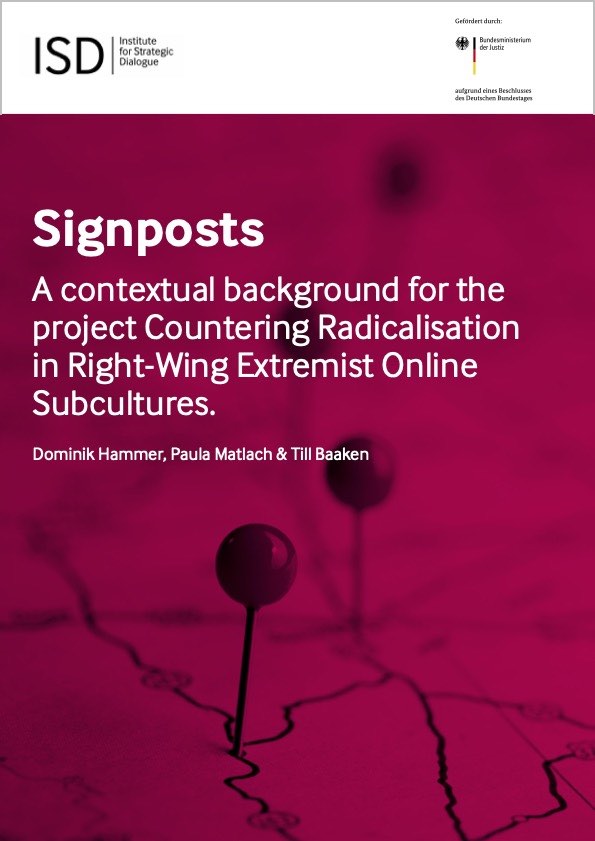Signposts – A background report on right-wing extremist online subcultures

Authors: Dominik Hammer, Paula Matlach & Till Baaken
Published: 24 October 2022
“Signposts” provides background information on the publications of the project “Countering Radicalisation in Right-Wing Extremist Online Subcultures” funded by the Federal Ministry of Justice (BMJ).
In the first part of this report, a brief historical overview of right-wing extremist internet use in Germany is given. The report describes how, since the emergence of the internet, the extreme right in Germany has always found ways to utilise the latest technological and social developments, such as the emergence of Web 2.0, for their own purposes. The first part of the report also presents the state of research on the right-wing extremist online milieu and describes focal points of current research on right-wing extremism.
The second part of the report describes the conceptual preparatory work that preceded the analyses within the framework of the project. This includes, on the one hand, the development of a definition of right-wing extremism for the project. This is because a uniform definition of the term does not exist, but is necessary for concise and transparent research into the right-wing extremist online milieu. Furthermore, in preparation for data driven analyses in the project, interviews with right-wing extremism experts were conducted, which revealed current developments in right-wing extremist internet strategies. The experts interviewed shared the following insights, among others:
- Large platforms retained their importance as entry platforms. Gaming platforms also gained in importance.
- In German-speaking countries, alternative platforms for audiovisual content and the messenger service Telegram are particularly relevant.
- So-called mainstream platforms are used to address a wider audience, while alternative platforms are used to distribute radical content.
- Audiovisual platforms have not been researched sufficiently yet.
- The research on alt-tech focuses mainly on platforms for end users, but it is also important to look at upstream platforms.
- Moderation on the different platforms is enforced to varying degrees.
- Where implemented, the moderation efforts of the mainstream platforms had been quite effective.
- A central current development is the intermingling of conspiracy ideologues, anti-vaxxers and right-wing extremists.
The method used for conducting the interviews as well as other key findings of the interviews are described in the report.
While the research reports of the project “Countering Radicalisation in Far-Right Online Subcultures” are based on different methods of empirical data analysis, this background report highlights the historical and conceptual aspects of the project.
Dominik Hammer is a Research Manager at ISD, where his activities include analysing far-right radicalism and right-wing extremism online. His areas of interest include democratic theory, the strengthening of democratic practice and the analysis of anti-democratic movements. Before joining ISD, his experience included university research and teaching, as well as adult education. He is co-author of the ISD research reports Escape Routes, Telegram as a Buttress, Detours and Diversions, and Auf Odysee, as well as the conference report In the Blind Spot.
Paula Matlach is an Analyst at ISD, where she studies the spread of disinformation and propaganda in German-speaking and English-speaking countries. Prior to joining ISD, she spent 18 months working as a researcher at the NATO Strategic Communications Centre of Excellence, where she published articles on network regulation and foreign influence, among other topics. She is co-author of the ISD research reports Escape Routes, Deutschland und der angebliche Klimalockdown and Auf Odysee.
Till Baaken is a Senior Manager at ISD, where he investigates right-wing extremism, Islamism, disinformation campaigns and conspiracy narratives in German-speaking and English-speaking countries. His work on radicalisation and deradicalisation has been published in a range of journals, including the Journal for Deradicalisation and the International Journal of Conflict and Violence, as well as several books and handbooks. He is co-author of the ISD research reports Escape Routes and Disinformation Overdose: A study of the Crisis of Trust among Vaccine Sceptics and Anti-Vaxxers.
Editorial responsibility: Huberta von Voss, Executive Director ISD Germany
This report was produced as part of the project “Countering radicalisation in right-wing extremist online subcultures” funded by the Federal Ministry of Justice (BMJ). The responsibility for the content lies exclusively with ISD Germany.
“Signposts” was first published in German as “Wegweiser – Hintergrundbericht für das Projekt ‘Radikalisierung in rechtsextremen Onlinesubkulturen entgegentreten’” on 23 September 2021.
